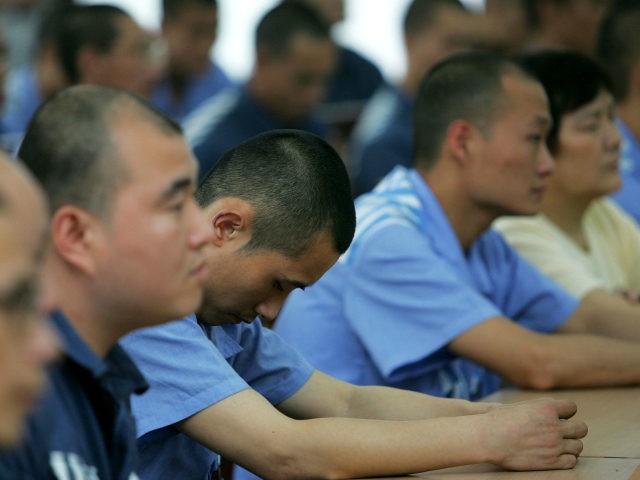China’s government-run Global Times newspaper encouraged the world on Thursday to embrace capital punishment for drug crimes, lamenting that “some people are still spending plenty of time talking about human right [sic] of drug smugglers.”
The Global Times published the opinion piece, urging “no mercy” for individuals accused of drug trafficking, following the revelation Thursday that a Chinese court had convicted Canadian citizen Robert Lloyd Schellenberg of smuggling an “astonishing” untold amount of drug materials and that he faced an appeal on Saturday. The Chinese government has not specified what kind of drugs Schellenberg was allegedly smuggling into the country. Without the appeal, Schellenberg may face the death penalty, a possibility the Times relishes.
“Punishing harshly drug crimes showed China’s zero-tolerance on drug offenses, which extends the same treatment to both Chinese citizens and foreigners who crossed the red line on Chinese soil,” the newspaper notes. “Only in this way can the nation effectively stop illegal drug trafficking outside its doorstep.”
The Times criticized those who argued that individuals accused of drug crimes are entitled to due process and respect for their human rights. “When some people are still spending plenty of time talking about human right [sic] of drug smugglers, they are actually putting others lives, even the entire society at danger,” the column alleges. “When they care about the human right [sic] of those condemned criminals, what should people do to the human right [sic] of the victims and their families?”
“This is why China is resolutely fighting against drug traffickers, and why China still practices capital punishment against the crime,” it concludes. “When the right of legal citizens can hardly be protected, any proposal to care about felons is equivalent to crimes.”
The Times finally adds that China has the right to “sovereignty” to kill people it deems social dangers and applauds the Communist Party because it “won’t give the wrongdoer a way out simply because the criminal is a foreigner.”
The campaign to increase the number of executions of alleged drug criminals is part of Communist Party leaders’ war on drugs “with Chinese characteristics,” officially launched in June. Xi urged the nation’s drug authorities to grant the Communist Party more power over regulating drugs to “give full play to the political and system advantages, improve the anti-drug work mechanism, heighten responsibilities for officials and mobilize the public.”
Schellenberg is the fourth Canadian citizen the Chinese government has publicly confirmed under police custody in the country since the arrest this month of Huawei CFO Meng Wanzhou in Canada for allegedly plotting to violate sanctions on the government of Iran. Huawei is one of China’s largest companies and a global technology giant, often accused by a variety of international actors of violating legal norms and cooperating with the Chinese communist regime to spy on persons of interest. The Canadian government granted Meng bail but required her to remain in Vancouver, where she owns a home, for the remainder of her trial.
Since Meng’s arrest on December 1, Beijing has announced the arrests of Schellenberg, teacher Sarah McIver, former diplomat Michael Kovrig, and businessman Michael Spavor–all Canadians. McIver faces charges of working in the country illegally, while the Global Times has made no secret of linking Spavor’s and Kovrig’s arrests to Meng’s. Unlike those cases, the Chinese Foreign Ministry told reporters they had no further details on the case and did not link Schellenberg to the Huawei case.
“As to the diplomatic tensions between China and Canada, I think you are very clear about the reason for that. I have made clear China’s solemn position on it many times before,” Foreign Ministry spokeswoman Hua Chunying said on Thursday, without elaborating.
China has increased its propaganda against drug traffickers and drug use generally in recent months independent of the situation with Huawei’s CFO, largely in response to its role in the American opioid epidemic. China is the world’s primary manufacturer of fentanyl, a hyper-potent opioid linked to tens of thousands of American overdose deaths a year. When confronted about its role in flooding world pharmaceutical markets with the drug, Chinese authorities and media typically revert to China’s capital punishment policy for drug smugglers, while its media blame American culture for allegedly promoting drug use.
“The United States should look within to cut down demand for opioids which are fueling its deadly drug crisis rather than stressing unsubstantiated claims that China is the major source of these chemicals,” Yu Haibin of the China National Narcotics Control Commission told the Associated Press last year regarding opioid trafficking. “As many states decriminalize marijuana, the public’s attitudes and trends of thinking toward drugs will also have a bad effect.”
The Global Times has accused American leaders, including President Barack Obama, of promoting drug culture, linking marijuana use to fentanyl overdoses without providing any corroborating statistics.

COMMENTS
Please let us know if you're having issues with commenting.